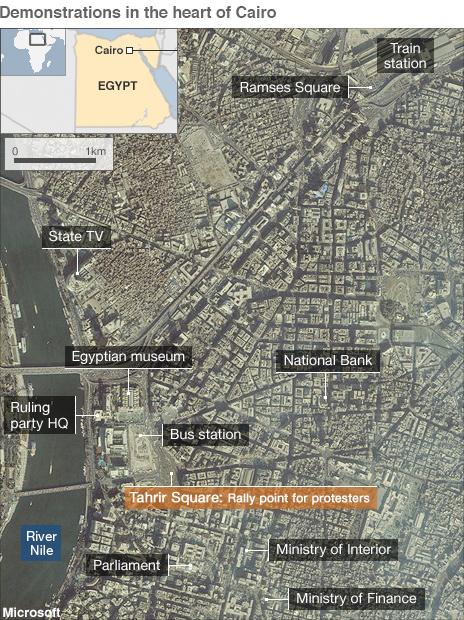Egypt unrest: Army calls on protesters to go home
- Published
The BBC's Wyre Davies: "Some Egyptians believe President Mubarak has done enough to appease the people"
Egypt's army has called for protesters to return home and allow life to return to normal after nine days of anti-government demonstrations.
The call came amid continued pressure on President Hosni Mubarak to quit after a speech in which he pledged not to stand for re-election in September.
Many protesters vowed not to leave Cairo's Tahrir Square, saying Mr Mubarak's promise was not enough.
But thousands have also taken to Cairo's streets to support him.
Up to 2,000 anti-Mubarak demonstrators saw out a cold night in Tahrir Square, the epicentre of the protests, saying the president's pledge was insufficient and chanting: "We will not leave!". They want to see him deposed and punished.
On Tuesday, hundreds of thousands had protested across the country, the culmination of more than a week of demonstrations that have left about 300 people dead according to UN estimates.
'Different step'
In its statement, the army - which is widely seen as an arbiter in the crisis - called for demonstrators to return to their homes.
"Your message has arrived, your demands became known... you are capable of bringing normal life to Egypt," said a spokesman in a message broadcast on state television.
Shortly afterwards, troops reportedly intervened to prevent pro-Mubarak protesters from marching into Tahrir Square and avoid a possible flare-up with the anti-government demonstrators camped out there.
In Tuesday night's speech, Mr Mubarak had promised to leave at the next polls, and pledged constitutional reform, saying he would devote his remaining time in power to ensuring a peaceful transition of power to his successor.
"This is my country. This is where I lived, I fought and defended its land, sovereignty and interests, and I will die on its soil," he said.
US President Barack Obama responded by saying an orderly transition "must begin now", while Turkey's PM Recep Tayyip Erdogan said Mr Mubarak should take a "different step".
Meanwhile, internet service was reportedly returning to the country, having been cut off for days by the government. State television also reported an easing of a nationwide curfew - with restricted hours from 1700-0700 (1500-0500GMT) rather than 1500-0800.
State media reported that parliament had been suspended until the results of last year's contested elections were revised. It added that the parliamentary speaker had called for Mr Mubarak's proposed constitutional reforms to be implemented within two-and-a-half months.
Opposition leader Mohamed ElBaradei dismissed Mr Mubarak's move as "a trick" to stay in power, and Tahrir Square protesters have vowed to continue their demonstrations until Mr Mubarak quits.
Abdelhalim Kandil, leader of Egypt's Kifaya (Enough) opposition movement, said Mr Mubarak's offer not to serve a sixth term was not enough.
"I will tell you very simply that there is an unprecedented popular movement that rejects the presence of the president on a scope that has not been seen before, that is calling for the will of the people to be imposed," he said.
If Mr Mubarak does not step down, demonstrators have planned to march on the presidential palace.
Win-win situation?
Some demonstrators said they did not trust their 82-year-old leader to enact the necessary constitutional changes.
President Obama: "An orderly transition must be meaningful, it must be peaceful and it must begin now"
"The speech is useless and only inflames our anger," one protester, Shadi Morkos, told Reuters. "We will continue to protest."
However, other Egyptians said they believed that Mr Mubarak's offer could be a suitable compromise.
Omneya Okasha, a resident from Alexandria, told the BBC she believed that sudden change could lead to "more drastic consequences".
"I find this a stable solution something that suits both sides - a win-win situation."
